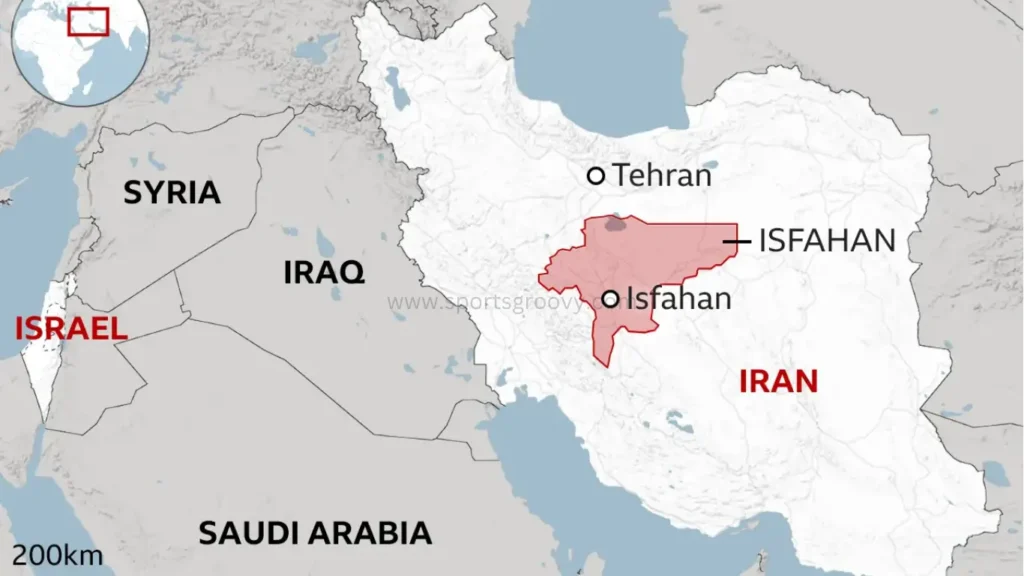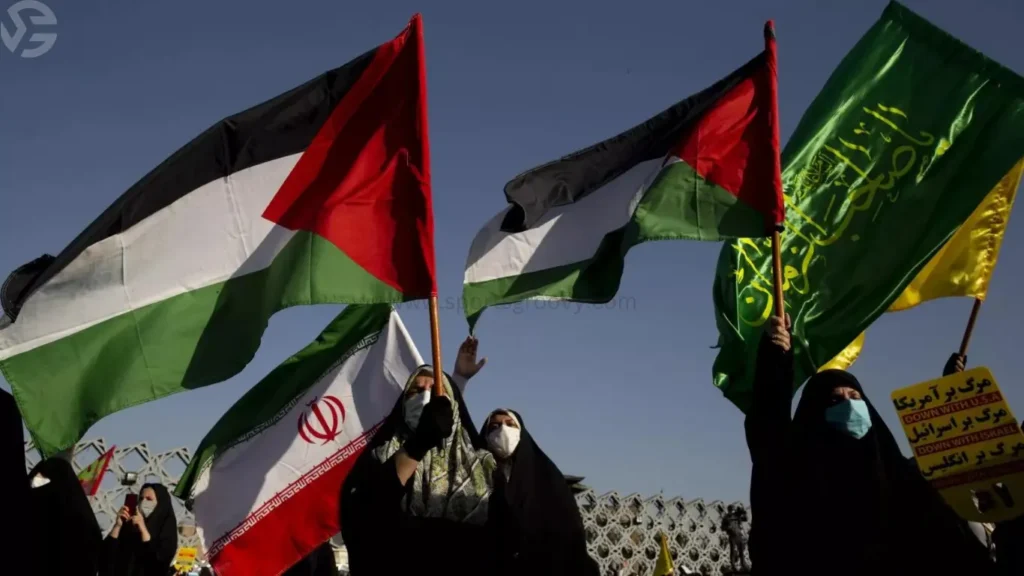News
Israel Airstrikes on Iran, Israel Iran Conflict’s Impact and Future Implications

Israel airstrikes on Iran in Response to Recent Missile and Drone Attacks, Says Israeli Official. The main reason of Israel Iran conflict is previous Sunday’s attack on Iran by Israel.
According to an Israeli official speaking on Friday, the Israeli military launched a strike inside Iran as a retaliation for the recent barrage of missiles and drones. The strike’s impact wasn’t immediately clear, but the official, who preferred to stay anonymous due to the sensitive nature of the topic, mentioned it aimed to show Iran that Israel can hit targets within the country.

Another source, not authorized to discuss the matter publicly but familiar with an Israeli briefing on the attack, described the strike as ‘carefully calibrated,’ implying it was carried out with precision and careful planning.
This development highlights the escalating tensions between Israeland Iran, with both sides flexing their military capabilities. The situation is being closely watched as it unfolds, with implications for the broader region.
Following a recent attack by Iran on Sunday, where Tehran launched hundreds of drones and missiles towards Israel, Israel has retaliated with strikes of its own. Most of Iran’s attacks were either intercepted or caused minimal damage.
The strikes by Israel seem to fulfill the promise they made to respond to Iran’s aggression. The exact details of the strikes and their impact are still unfolding.
A U.S. military official, speaking anonymously on Thursday, shed light on the situation, indicating the seriousness of the events unfolding in the region.
These developments underscore the ongoing tensions between Israel and Iran, with both sides engaging in military actions and counteractions, raising concerns about stability in the area.
Details regarding the extent of Israel’s strikes and the specific weapons utilized remain shrouded in uncertainty.
Iran’s state news agency, IRNA, reported statements from a military official in Isfahan, Brigadier General Mihan Dost, who mentioned that loud sounds heard to the east of the city were attributed to their air defenses intercepting what he described as a ‘suspicious target.’ Fortunately, no damage was reported in the area.
These conflicting reports add to the complexity of the situation, leaving many questions unanswered about the events and their aftermath. As tensions persist between Israel and Iran, clarity regarding the recent military actions and their implications remains crucial.
Reports on Isfahan Incident:

Some Iranian News Agencies Attribute Sounds to Drone Interception.
While the Iranian state news agency, IRNA, reported that air defenses intercepted a “suspicious target” near Isfahan, other Iranian news agencies have not corroborated this claim. Instead, they suggest that the sounds heard near Isfahan were likely the result of intercepting one or more drones.
This discrepancy in reporting underscores the confusion surrounding the recent events. As conflicting narratives emerge, it becomes increasingly challenging to ascertain the precise nature of the incident and its implications.
The differing interpretations highlight the need for thorough investigation and clarity to understand the situation fully. Amidst heightened tensions in the region, accurate information is essential for informed analysis and diplomatic responses.
No Response from Israel to NPR’s Inquiry, IAEA Confirms No Damage to Iran’s Nuclear Sites.
Despite NPR’s request for comment, Israel’s military and prime minister’s office have remained silent on the recent events.
The International Atomic Energy Agency (IAEA) has taken to social media to confirm that Iran’s nuclear sites have not suffered any damage as a result of the recent actions.
On the other hand, Israel’s National Security Minister, Itamar Ben-Gvir, expressed his dissatisfaction with Israel’s apparent strike against Iran on the social media platform X (formerly known as Twitter). Ben-Gvir criticized the strike, labeling it as ‘weak’ and ‘too limited.’
These statements and lack of response from Israeli authorities add another layer of complexity to the situation, as perspectives on the recent developments diverge. As tensions persist in the region, clarity and transparency from all parties involved become increasingly important.
Commercial Flights :
Despite the recent military activities and heightened tensions, commercial flights continue to operate as usual in and out of Israel. This suggests that air travel remains unimpeded, reflecting a sense of normalcy in the country’s aviation sector.
Additionally, Israel’s Home Front Command system, tasked with issuing threat alerts to civilians during periods of heightened military tension, has not adjusted its threat level. This indicates that, at least for now, authorities do not perceive an immediate heightened risk to civilians.
These developments provide a glimpse into the broader context of the situation, showing that life in Israel carries on amid geopolitical uncertainties. However, the situation remains fluid, and stakeholders continue to monitor developments closely for any changes that may necessitate adjustments in response.
Temporary Grounding of Flights in Iran, Operations Resume After Brief Interruption.
In Iran, there was a temporary halt to flights in the morning, causing disruptions to air travel. However, within just a couple of hours, flight operations resumed. It bringing relief to travelers and restoring normalcy to the country’s aviation sector.
The brief grounding of flights highlights the impact of heightened tensions on daily life in Iran. While the interruption was temporary, it underscores the need for vigilance and preparedness in the face of geopolitical uncertainties.
As the situation continues to evolve, authorities in Iran and across the region are likely to remain vigilant. Ready to respond to any developments that may affect air travel and other aspects of daily life.
Worries Escalate Over Potential Conflict:

Hamas is considered a militant group by Israel, the United States, the European Union, and other countries. They have been involved in conflicts with Israel. All they have been designated as a terrorist organization by some countries and international bodies.
Tensions have escalated as Iran accuses Israel of carrying out an air strike. That resulted in the deaths of two Iranian military commanders inside Iran’s consulate in Damascus, Syria, on April 1st.
This incident has heightened concerns among the United States and its western allies. Who have been urging Israel to refrain from military action to prevent a broader regional conflict. Especially in the backdrop of ongoing tensions stemming from the Israel-Hamas war.
The situation remains volatile as accusations and tensions continue to mount between Israel and Iran, with the potential for further escalation looming large.
Iran stated that Sunday’s attack on Israel was a retaliation for the incident in Damascus.
The region has been on the brink of a larger conflict since Hamas attacked Israel on October 7th. Israel claims that attack resulted in 1,200 deaths. Following this, Israel’s invasion of Gaza occurred, reportedly resulting in more than 33,000 deaths according to Gaza health officials.
Israel and Iran-backed Hezbollah have been exchanging frequent gunfire along the northern border of Israel. Meanwhile, Houthi militants, supported by Iran, have been attacking international commercial ships in the Red Sea recently. The leaders of this group say they’re targeting vessels with connections to Israel in retaliation for Israel’s ongoing invasion of Gaza.
Understanding the Targeting of Isfahan:
Isfahan province, named after its largest city, holds strategic importance in Iran due to its extensive military infrastructure. This includes a large airbase, a significant missile production complex, and several nuclear facilities.
The recent strike on Isfahan comes shortly after Iran’s launch of numerous missiles and drones towards Israel. Which marking a significant escalation in tensions between the two nations. Despite Iran’s extensive attack, the majority of the projectiles were intercepted by Israeli air defenses. Israel have assistance from the US, UK, and other allies.
An earlier strike on an Iranian diplomatic compound in Syria on April 1st prompted Iran to assault Israel. While Israel has not officially acknowledged responsibility for this strike, many widely believe it to be the case.
The timing and targeting of Isfahan underscore the ongoing tensions between Iran and Israel. This condition with both sides engaging in retaliatory actions, further heightening concerns about regional stability.
Escalating Tensions, Israel-Iran Relations:
As we await further details, the true impact of the recent strike is still unfolding. It remains uncertain whether Iran will choose to retaliate in response.
BBC’s security correspondent, Frank Gardener, views Friday’s attack as relatively limited, almost symbolic in nature. It could be interpreted as a move to prevent further escalation of the conflict.
Israeli Prime Minister Benjamin Netanyahu faces pressure from both military leaders and political allies regarding how to respond to Iran’s actions, according to BBC’s international editor, Jeremy Bowen.
Internationally, Israel is under immense pressure from the US and other allies to avoid actions that could escalate the long-standing proxy war between Israel and Iran into a direct conflict.
Amidst the ongoing conflict in Gaza, the Israeli military is engaging in fighting against Hamas, which Iran supports.
World Leaders Call for Restraint:
Global Leaders Call for Calm After Friday’s Strike.
Egypt expressed deep concern over the ongoing escalation between Israel and Iran, urging utmost restraint to prevent further conflict and instability in the region.
European Commission President Ursula von der Leyen emphasized the importance of maintaining stability in the region and urged all parties to refrain from further actions that could escalate tensions.
China’s Foreign Ministry echoed similar sentiments, opposing any actions that could worsen tensions in the area.
Turkey also called for restraint from all parties involved but placed blame on Israel for initiating the tensions with its attack on the Iranian Embassy in Damascus.
Oman condemned Israel’s attack on Isfahan, Iran, and denounced Israel’s repeated military violations in the region. The statement from Oman’s Foreign Ministry called for addressing the underlying causes of instability and emphasized the need for a ceasefire in Gaza and a just solution to the Palestinian issue to restore regional stability.
-

 Soccer5 months ago
Soccer5 months agoDutch Fans in Blackface to Imitate Ruud Gullit, One Agrees to Stop
-

 Soccer5 months ago
Soccer5 months agoEx Glamour Model Says Party with England Team Before Euros
-

 News8 months ago
News8 months agoDubai Flood, Rain Turns Desert to Aquarium🌧️🐠
-

 Soccer5 months ago
Soccer5 months agoArgentina vs Peru 2-0 Highlights & All Goals Copa America 2024
-

 NBA6 months ago
NBA6 months agoCelebrate with the Boston Celtics: Parade and Traffic Updates
-

 Soccer6 months ago
Soccer6 months agoUEFA EURO 2024: Essential Guide and Key Information
-

 Soccer5 months ago
Soccer5 months agoVinicius Jr Scores Two Goals in Brazil’s Win Vs Paraguay in Copa America 2024
-

 Entertainment7 months ago
Entertainment7 months agoThe Try Guys’ Journey From Four to Two














Pingback: Republican Support Grows to Oust Speaker Mike Johnson, His Position in Peril - Sports Groovy